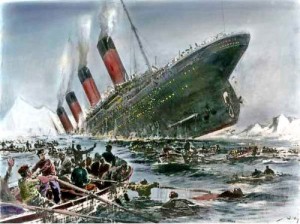 If there is an image that corresponds to the state of the world economy, it would be that of a cruise ship on a never-ending cruise. On its decks, there is every modern comfort and entertainment. The bands are playing, the restaurants crowded and the theaters are full. There is an atmosphere marked by fun and laughter, and every effort is made to keep the party going.
If there is an image that corresponds to the state of the world economy, it would be that of a cruise ship on a never-ending cruise. On its decks, there is every modern comfort and entertainment. The bands are playing, the restaurants crowded and the theaters are full. There is an atmosphere marked by fun and laughter, and every effort is made to keep the party going.
Behind the almost surreal impressions of unconcern, however, storms and internal problems threaten the ship.
Such an image is not the evaluation of some casual observer but rather the chief economist of one of the world’s largest banking institutions.
HSBC Chief Economist Stephen King claims another recession is in the offing and the world banking system is not unlike the Titanic. In mid-May, King issued a grim 17-page report titled “The World Economy’s Titanic Problem.” If the allusion to the Titanic is not bad enough, the economist adds that the ship has no lifeboats should a crash or recession occur.
King is not the first expert nor will he be the last to warn of a coming crisis. What makes his analysis especially insightful is his look at the tools at hand to fight back. He notes that the present six-year “recovery” is unlike any other. Traditionally, policy makers have employed a whole set of tools to fight against recession. Gradually, they adjust policies to help bring things back to normal.
However, there is nothing normal about this “recovery.”
To deal with the 2008 subprime mortgage crisis, policy makers pulled out all the stops and threw everything that could at the problem — often aggravating the crisis more than helping it. To deal with the present crisis, all the stopgap band-aid solutions are being used to their fullest: the Federal Reserve has cut its rates to near zero, stimulus programs are trying to jumpstart spending and quantitative easing is injecting massive amounts of cash into the economy.
Such measures barely keep the “recovery” going. Should another recession appear on the horizon, King warns that there will be nothing left to “replenish their ammunition.” There will be few lifeboats for the global Titanic economy as it travels through iceberg-ridden waters. At the same time, internal problems like uncomfortably high budget deficits and record debt levels will impede navigation.
King believes the situation is so fragile that anything can trigger a new recession — a collapse in faltering China, a lack of liquidity in pension or insurance funds, an abrupt rise in rates. Any such event would lead to a crisis and a corresponding need for nonexistent lifeboats. King’s solution is to do everything to avoid a new recession by using up what few lifeboats remain and hope for the best.
The trouble with economists like King is that they believe that economics is an exact science like physics. They think the problem is just the mechanics of the ship and not the decisions of the people aboard. Their solutions consist of tweaking the ship with QE and stimulus to better navigate. Such tinkering has its limitations since what really determines the direction of the ship is the actions of those on board.
That is why economics can never be an exact science: it depends on the nuanced and free actions of man which are so very unpredictable. In addition to adjusting the ship, it is time to address what might be called the frenetic intemperance of the markets and culture that throw the whole ship out of balance with its party economy. People need to start building lifeboats. The problem is not just the ship. It’s time to declare the party is over.


